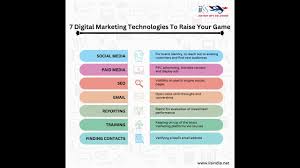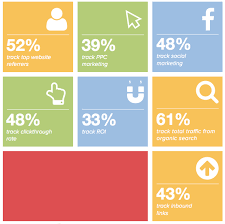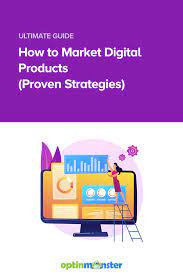Digital Marketing Technologies: Revolutionizing the Way Businesses Connect with Customers
In today’s fast-paced digital era, businesses are constantly seeking innovative ways to connect with their target audience. With the advent of digital marketing technologies, companies now have powerful tools at their disposal to reach and engage customers like never before. These technologies have revolutionized the marketing landscape, enabling businesses to effectively promote their products or services and drive growth. Let’s explore some of the key digital marketing technologies that are reshaping the industry.
Social Media Marketing:
Social media platforms have become a central hub for businesses to interact with their customers. From Facebook and Instagram to LinkedIn and Twitter, these platforms offer an immense opportunity for targeted advertising, brand building, and customer engagement. Advanced analytics allow marketers to track campaign performance in real-time, ensuring maximum return on investment (ROI). Additionally, social listening tools enable businesses to monitor conversations about their brand and gain valuable insights into customer preferences.
Search Engine Optimization (SEO):
SEO plays a crucial role in driving organic traffic to websites. By optimizing websites for search engines like Google or Bing, businesses can improve their visibility in search results and attract more potential customers. SEO techniques include keyword research, on-page optimization, link building, and content creation. With continuous algorithm updates by search engines, staying up-to-date with SEO best practices is essential for maintaining a competitive edge.
Pay-Per-Click (PPC) Advertising:
PPC advertising allows businesses to display ads on search engines or other websites and pay only when users click on them. Platforms like Google Ads enable precise targeting based on keywords, demographics, interests, or location. This level of customization ensures that ads reach the right audience at the right time. By closely monitoring campaign performance metrics such as click-through rates (CTR) and conversion rates, marketers can optimize campaigns for better results.
Content Marketing:
Content marketing focuses on creating valuable and relevant content that attracts and engages the target audience. Blog posts, articles, videos, infographics, and podcasts are just a few examples of content formats used to educate, entertain, or inspire customers. By providing valuable information, businesses can establish themselves as industry thought leaders and build trust with their audience. Content marketing also plays a significant role in SEO efforts by generating backlinks and driving organic traffic.
Marketing Automation:
Marketing automation platforms streamline repetitive marketing tasks and enable personalized communication with customers at scale. These platforms allow businesses to automate email marketing campaigns, lead nurturing processes, social media scheduling, and more. By segmenting customers based on their behavior or preferences, marketers can deliver targeted messages that resonate with individuals on a more personal level.
Artificial Intelligence (AI) and Machine Learning (ML):
AI and ML technologies are transforming digital marketing by enabling predictive analytics, chatbots for customer support, personalized recommendations, and more. These technologies analyze vast amounts of data to identify patterns and make data-driven decisions. AI-powered chatbots provide instant customer support while ML algorithms help businesses understand customer behavior for improved targeting.
Digital marketing technologies have opened up new avenues for businesses to connect with their customers in meaningful ways. By leveraging these tools effectively, companies can enhance brand visibility, engage target audiences, drive conversions, and ultimately achieve business growth in the digital age. Embracing these technologies is no longer an option but a necessity for businesses looking to stay competitive in today’s ever-evolving digital landscape.
Frequently Asked Questions About Digital Marketing Technologies: Exploring Marketing Technologies, the 7 C’s, and Modern Innovations
- What are the marketing technologies?
- What are the 7 C’s of digital marketing?
- What are the digital marketing technologies?
- What are the 10 modern technologies used in marketing the products?
What are the marketing technologies?
Social Media Marketing: Social media platforms such as Facebook, Twitter, Instagram, Pinterest, and LinkedIn are powerful tools for marketing and connecting with customers.
Content Marketing: Content marketing involves creating and sharing content such as blog posts, videos, infographics, and other forms of media to engage potential customers and build brand awareness.
Email Marketing: Email marketing is a great way to send personalized messages to customers and prospects. It can be used to nurture leads, drive sales, or simply keep customers informed about your business.
Search Engine Optimization (SEO): SEO is the process of optimizing web pages for higher rankings in search engine results pages (SERPs). This helps businesses get more organic traffic from search engines like Google and Bing.
Pay-Per-Click Advertising (PPC): PPC is an online advertising model in which advertisers pay each time a user clicks on their ad. This is a great way to quickly get visibility for your business on search engines like Google and Bing.
Conversion Rate Optimization (CRO): CRO is the process of optimizing website elements such as landing pages, forms, calls-to-action (CTAs), etc., to maximize the percentage of visitors that convert into leads or customers.
7. Web Analytics: Web analytics tools help you track user behavior on your website so you can better understand how people are interacting with your content and optimize accordingly.
What are the 7 C’s of digital marketing?
The 7 C’s of digital marketing are a framework that helps businesses develop effective digital marketing strategies. These 7 C’s are:
- Content: Content is at the core of any successful digital marketing strategy. It refers to the creation and distribution of valuable, relevant, and engaging content that attracts and retains customers.
- Context: Context refers to understanding the specific needs, preferences, and behaviors of your target audience. By tailoring your marketing efforts to match the context in which your customers interact with your brand, you can deliver more personalized and relevant experiences.
- Channels: Channels represent the various platforms and mediums through which you can reach your target audience. These include websites, social media platforms, email marketing, search engines, mobile apps, and more. Identifying the most effective channels for your business is crucial for maximizing your reach.
- Community: Building a strong online community around your brand is essential for fostering customer loyalty and advocacy. Engaging with your audience through social media interactions, online forums, or user-generated content helps create a sense of belonging and encourages customers to become brand advocates.
- Communication: Effective communication involves establishing clear messaging that resonates with your target audience. It includes crafting compelling copywriting, using persuasive visuals or videos, and ensuring consistent branding across all communication channels.
- Conversion: Conversion refers to turning potential customers into paying customers or achieving any desired action from them (such as signing up for a newsletter or downloading an ebook). Optimizing conversion rates involves creating compelling calls-to-action (CTAs), streamlining user experiences on websites or landing pages, and implementing effective lead nurturing strategies.
- Customer Experience (CX): Providing an exceptional customer experience is vital in today’s digital landscape. CX encompasses every interaction a customer has with your brand across multiple touchpoints throughout their journey – from initial awareness to post-purchase support. Delivering seamless experiences that exceed customer expectations fosters loyalty and drives repeat business.
By incorporating these 7 C’s into their digital marketing strategies, businesses can create a comprehensive and customer-centric approach that helps them stand out in the competitive digital marketplace.
What are the digital marketing technologies?
Content Management Systems (CMS)
Search Engine Optimization (SEO)
Social Media Marketing (SMM)
Pay-Per-Click Advertising (PPC)
Email Marketing
Mobile Marketing
Online Video Platforms
Web Analytics
Conversion Rate Optimization (CRO)
10. Programmatic Advertising
What are the 10 modern technologies used in marketing the products?
- Social Media Marketing: Leveraging social media platforms like Facebook, Instagram, Twitter, LinkedIn, and YouTube to promote products or services and engage with target audiences.
- Search Engine Optimization (SEO): Optimizing websites and content to improve visibility in search engine results and drive organic traffic.
- Pay-Per-Click (PPC) Advertising: Running targeted ads on search engines or other websites and paying only when users click on them.
- Content Marketing: Creating valuable and relevant content such as blog posts, articles, videos, infographics, and podcasts to attract and engage customers.
- Influencer Marketing: Collaborating with influential individuals on social media who have a large following to promote products or services to their audience.
- Email Marketing: Sending targeted emails to nurture leads, build relationships with customers, and promote products or services.
- Marketing Automation: Using software platforms to automate repetitive marketing tasks such as email campaigns, social media scheduling, lead nurturing processes, etc.
- Artificial Intelligence (AI) and Machine Learning (ML): Utilizing AI-powered technologies for predictive analytics, personalized recommendations, chatbots for customer support, and data-driven decision-making.
- Augmented Reality (AR) and Virtual Reality (VR): Integrating AR/VR technologies into marketing strategies to provide immersive experiences for customers when interacting with products or brands.
- Mobile Marketing: Optimizing marketing efforts for mobile devices by utilizing mobile apps, SMS marketing campaigns, location-based targeting, and responsive website design.
These modern technologies have transformed the way businesses market their products or services by enabling more targeted advertising strategies, personalized customer experiences, data-driven decision-making processes, and enhanced engagement with customers across various digital platforms.




